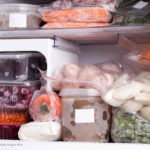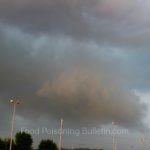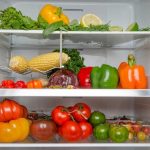It's now four days after Thanksgiving, and that means that all leftovers from that holiday dinner must be discarded or frozen today, according to the USDA. Of course, this is assuming that you refrigerated that food promptly - within two hours of it coming out of the fridge or oven. Between the temperature range of 40°F to 140°F, bacteria numbers can double in foods every 20 minutes. And those pathogens can make toxins that aren't destroyed by heat. So even if you thoroughly reheat leftovers to 165°F, as you should every time, you may still get sick. That's why we stress prompt refrigeration of perishable foods, including meats, egg dishes, seafood, poultry, casseroles, and cooked vegetables. To freeze foods, store them in freezer bags or other containers in relatively small … [Read more...]
Food Safety Tips During Hurricanes and Severe Storms
With the first named Atlantic hurricane approaching the U.S. mainland, the USDA is offering food safety tips during hurricanes and severe storms. The best thing to do is to be prepared before storms hit. And this advice applies to all Americans, not just those who live in hurricane-prone areas. First, make sure that you keep an appliance thermometer in your refrigerator and freezer. The freezer must be kept at 0°F or below, and the refrigerator between 33°F and 40°F to slow down most bacterial growth. Then, freeze containers of water for ice to help keep food frozen in the freezer or cold in the fridge or in coolers if the power goes out. Make more ice cubes too. You can also use this ice for drinking water if flooding occurs and you need a clean source of water. Freeze … [Read more...]
Don’t Put Frozen Food Outside During Power Outages Even if it’s Cold
There are major power outages in large swaths of the United States as a result of freezing temperatures and severe weather, and some bad food safety advice is circulating. When it's cold outside and you are worried about frozen food thawing and spoiling, you may be tempted to put the food outside to keep it frozen. That's a bad idea. Don't put frozen food outside. Even if there's snow on the ground and icicles hanging from your roof, outside temperatures can vary wildly. Frozen food is only safe if it stays below 0°F. Snow and ice will be present on the ground until the air temperature gets above 32°F, and even warmer temperatures than that. This fluctuation can cause thawing and freezing in your frozen food, causing loss of quality and perhaps even the growth of pathogenic … [Read more...]
Prepare For Food Safety During Power Outages WIth Tips From the FDA
As the U.S. enters the hurricane and tornado season, the FDA is offering tips for helping consumers prepare for food safety during power outages. Food can spoil if the power is out for hours, but you can save money and protect yourself by following these steps. First, make sure that you have appliance thermometers in your refrigerator and freezer. That's the best way to tell if the temperature in those appliances is cold enough to keep food safe from bacterial growth. The freezer should always be at 0°F or below, and the refrigerator should always be at or below 40°F. Then, think about freezing containers of water to help keep foods cold in the freezer, refrigerator, or coolers when the power goes out. The melting ice will also provide drinking water if you use water from the … [Read more...]
Do You Know How Long Foods Can Be Stored in the Fridge or Freezer?
Because of the coronavirus pandemic, many people are buying more food than they can eat in a week, or even in a month. While hoarding food is not helping the situation, these actions can help people feel safer. While nonperishable foods such as canned and shelf-stable products can be stored without worrying about food safety, do you know how long foods can be stored in the fridge or freezer? Foodsafety.gov has the answer with a chart. First, a note about expiration dates. Most of these dates, especially for canned foods or shelf stable foods, refer to the quality of the food, not to possible bacterial contamination. So if you have a can of peas that are past the "best if used by" date stamped on the can, you can still eat them; the peas just won't have a good color and the flavor … [Read more...]








